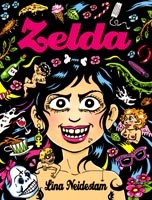Zelda by Lina Neidestam
When an comic author says that they know the characters so well that the story writes itself, it's time to bail out. Logically, if the author knows what joke will come up, so do the readers. Zelda, the main character of this album, is basically a raging, alcoholic, self-destructive, self-hating, self-absorbed, irresponsible, manipulative, fat, hairy feminist of the generic kind that we've come to forget from countless comics written by angry young women. With such a premise, the jokes should be the ones we know only too well; but what makes this one stand head and shoulders above the rest is what the author, Lina Neidestam, builds on top of that base.

ISBN: 9789186003425
Kartago, 2009
Swedish
Ingesting the book might lead to high blood levels of cynisism, but trust me, it'll do you good. For all her flaws, it is difficult not to root for Zelda. (4/5)
While we do get the standard jokes about sex (too much to be a good girl), food (too much to be a pretty girl) and love (too little to be a popular girl), Zelda is very much, as Lina herself describes it, a summary - although not an autobiography - of her own teens and early twenties, viewed from the vantage point of adulthood, with Zelda being an amplified and distorted caricature of the kind of character that adult Lina now sees that younger Lina was. It is this perspective that turns the book into the success that it so well deserves to be.
Many of the strips in the autobiographical comics that popped up like mushrooms about a decade ago were written and drawn almost immediately following the events the chronicle. Therefore the author has no distance to the event, and any self-distance is limited to making light of what happened; the author-character is as good as always in control. With both the chronological and intellectual distance between Lina-as-Zelda and Lina-the-author, the perspective shifts from one where the author-character are the parts of the author that they want us to see them as, to one where the author-character can be shown in full, warts and all.
The result is a surprisingly engaging main character. For all her flaws, it is difficult not to root for Zelda.
The second theme throughout the book is Lina's great writing. Ingesting the book might lead to high blood levels of cynisism, but trust me, it'll do you good. The strips aren't written as your average newspaper strips with one strip having one joke and one punchline. The author has shown that they can squeeze quite a lot of structure into four frames, and we're often treated to a rapid back-and-forth for three frames, with the fourth being more a sharp cut than a punchline.
In short, it's great. But not as great as the sequel - Zelda 2: Kampen Fortsätter.